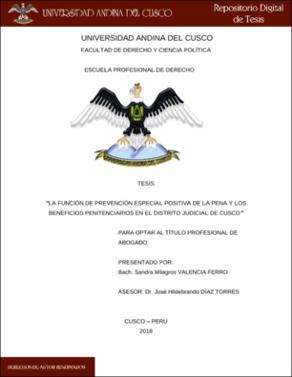| dc.contributor.advisor | Díaz Torres, José Hildebrando | |
| dc.contributor.author | Valencia Ferro, Sandra Milagros | |
| dc.date.accessioned | 2018-11-27T13:41:06Z | |
| dc.date.available | 2018-11-27T13:41:06Z | |
| dc.date.issued | 2018-04-24 | |
| dc.identifier.uri | https://hdl.handle.net/20.500.12557/2076 | |
| dc.description.abstract | La sanción penal es declarada por un juez mediante una sentencia que se le impone a una persona que ha cometido un delito, esta sanción es estrictamente de orden penal, tiene dos objetivos: busca prevenir y evitar la comisión del delito, constituye una especie de garantía para la sociedad. Los beneficios penitenciarios son mecanismos que promueven la resocialización del condenado mediante su participación en actividades laborales educativas. La Constitución Política del Perú en su artículo 139 inciso 22 también señala que el régimen penitenciario tiene por objeto la reeducación, la rehabilitación y reincorporación del penado a la sociedad. Dentro de la investigación hablamos de la teoría de la prevención especial, esta teoría se encuentra dentro del relativismo de las penas, también encuentra relación con diversas corrientes del pensamiento penal , la característica fundamental de esta pena es evitar las incidencias procurando adaptar al autor mediante tratamientos de resocialización. De la misma forma la ejecución de la pena privativa de la libertad corresponde al Instituto Nacional Penitenciario, quien mediante un tratamiento penitenciario tratará de alcanzar la rehabilitación del interno, esto es en el transcurso de la ejecución de la pena que el interno tiene el derecho de peticionar ciertos beneficios, estos beneficios son una gracia otorgada al interno los mismos que acortan el cumplimiento de la pena impuesta al penado.
El Código de Ejecución Penal señala que los beneficios penitenciarios son estímulos que se otorgan a los internos como parte de un tratamiento progresivo por nuestra legislación y responde a las exigencias de la pena. | es_PE |
| dc.description.abstract | The criminal sanction is declared by a judge through a sentence that is imposed on a person who has committed a crime, this sanction is strictly criminal, has two objectives: seeks to prevent and prevent the commission of the crime, is a kind of guarantee for society. Penitentiary benefits are mechanisms that promote the re-socialization of the prisoner through their participation in educational work activities. The Political Constitution of Peru in its article 139 paragraph 22 also indicates that the penitentiary regime has the object of reeducation, rehabilitation and reincorporation of the prisoner to society. Within the research we talk about the theory of special prevention, this theory is within the relativism of the penalties, also finds relationship with various currents of criminal thought, the fundamental characteristic of this penalty is to avoid incidents trying to adapt the author through treatments of resocialization. In the same way, the execution of the sentence of deprivation of liberty corresponds to the National Penitentiary Institute, who through a prison treatment will try to achieve the rehabilitation of the prisoner, that is in the course of the execution of the sentence that the prisoner has the right to Petition certain benefits, these benefits are a grace granted to the inmate who shorten compliance with the penalty imposed on the convicted. The Code of Criminal Enforcement states that penitentiary benefits are incentives that are granted to inmates as part of a progressive treatment by our legislation and responds to the demands of punishment. | en_US |
| dc.description.uri | Tesis | es_PE |
| dc.format | application/pdf | es_PE |
| dc.language.iso | spa | es_PE |
| dc.publisher | Universidad Andina del Cusco | es_PE |
| dc.rights | info:eu-repo/semantics/restrictedAccess | es_PE |
| dc.source | Universidad Andina del Cusco | es_PE |
| dc.source | Repositorio Institucional - UAC | es_PE |
| dc.subject | Beneficios penitenciarios | es_PE |
| dc.subject | Prevención positiva | es_PE |
| dc.subject | Resocialización | es_PE |
| dc.title | La función de prevención especial positiva de la pena y los beneficios penitenciarios en el distrito judicial de Cusco. | es_PE |
| dc.type | info:eu-repo/semantics/bachelorThesis | es_PE |
| thesis.degree.name | Abogada | es_PE |
| thesis.degree.grantor | Universidad Andina del Cusco. Facultad de Derecho y Ciencia Política | es_PE |
| thesis.degree.level | Titulo Profesional | es_PE |
| thesis.degree.discipline | Derecho | es_PE |

